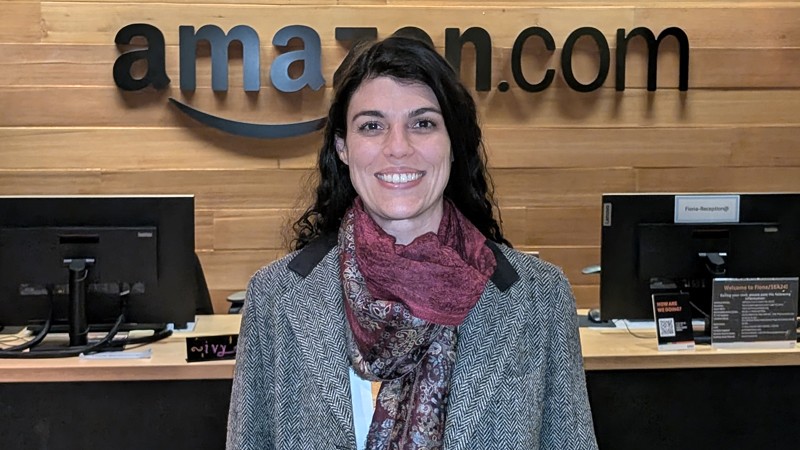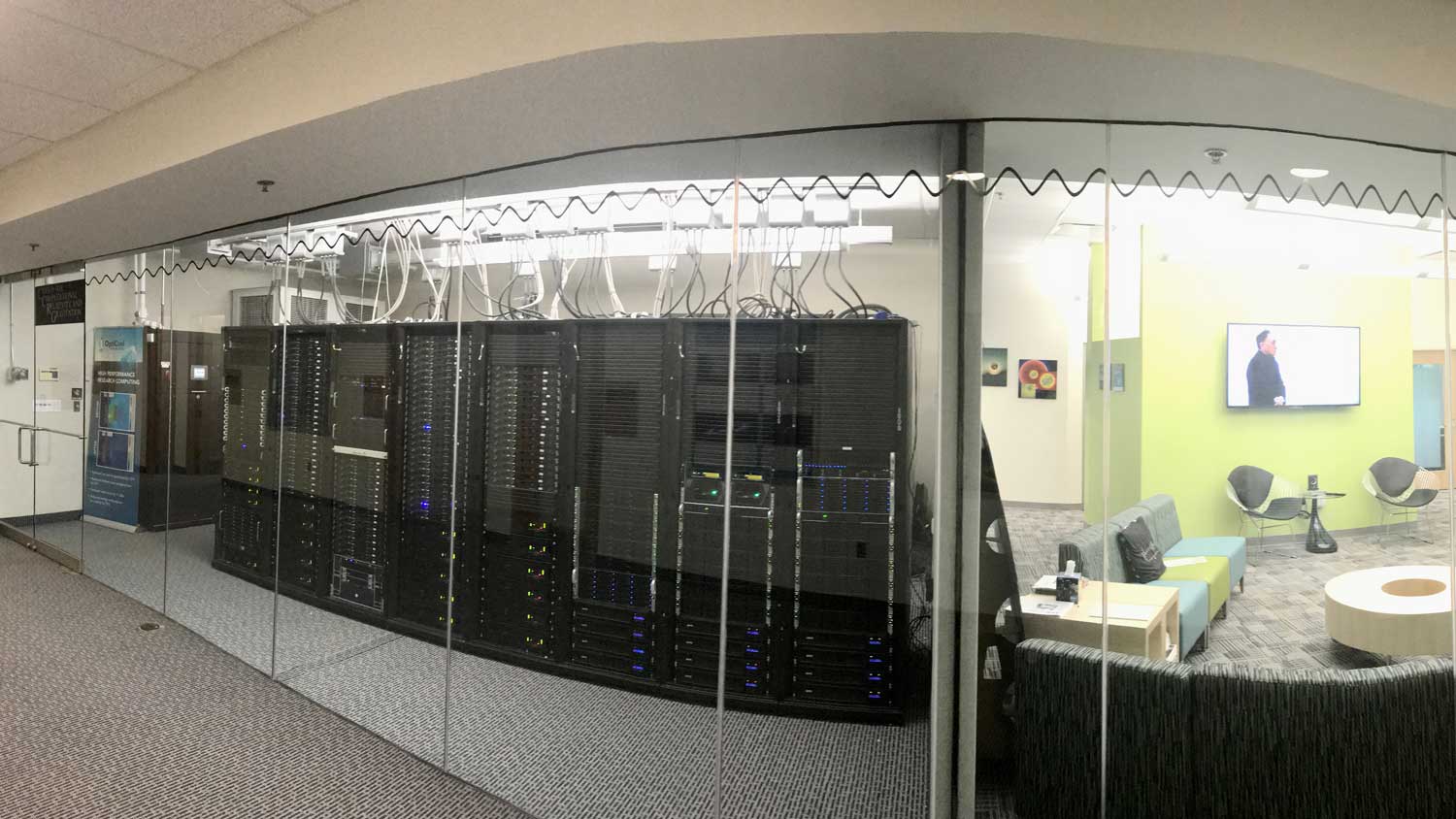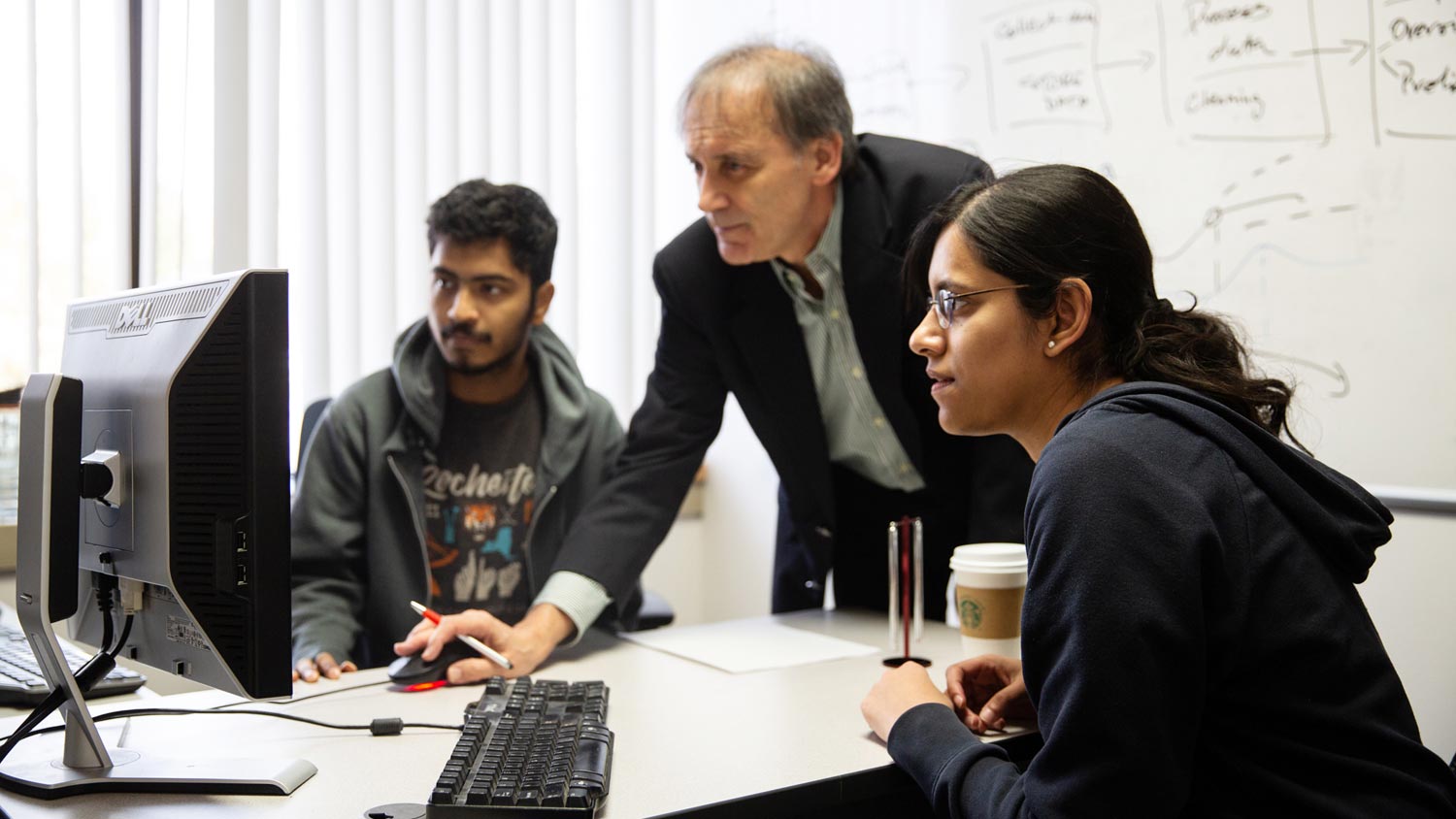School of Mathematics and Statistics
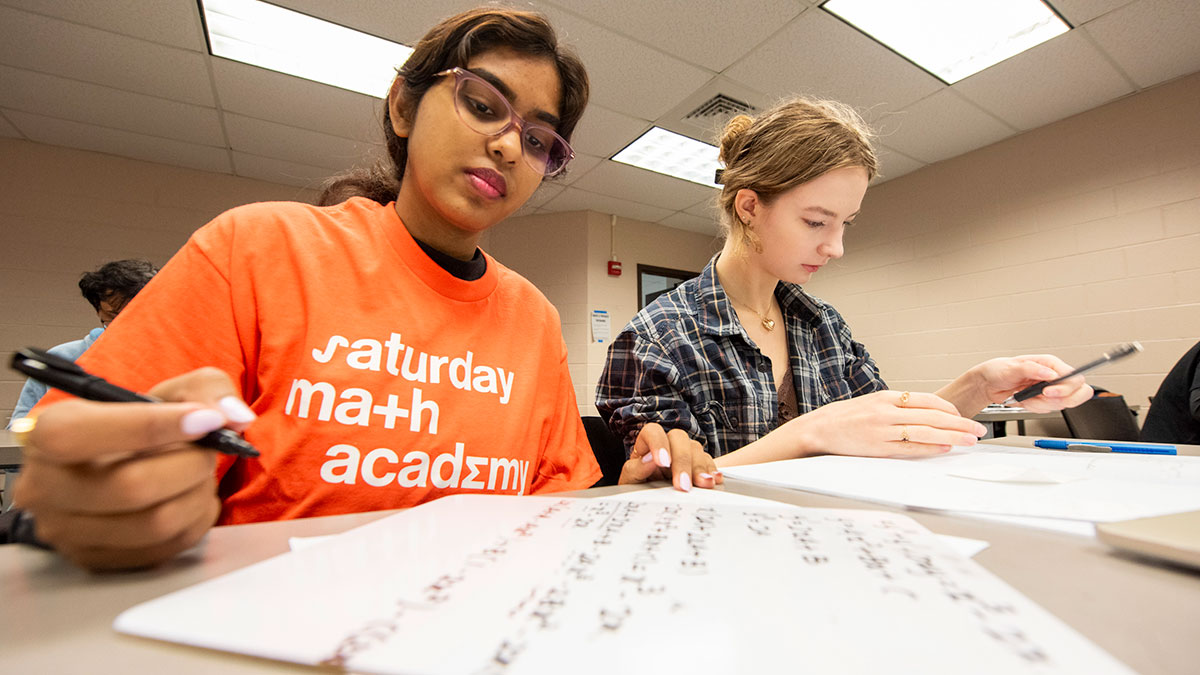
School of
Mathematics and Statistics
- RIT/
- College of Science/
- Academics/
- Schools and Centers/
- School of Mathematics and Statistics
Overview
The School of Mathematics and Statistics is recognized for its contributions to research and applications of mathematical and statistical science, and it’s also known for expertise in mathematical and computational modeling, data science, and scientific inference. Since mathematics is at the root of many social, technical, medical, and environmental issues faced by society today, we equip our graduates with a deep understanding of mathematical and statistical principles, tools to apply those skills to real-world problems, and the ability to express complex ideas in everyday language. We provide our students with research and experiential learning opportunities and nurture curiosity and creativity.
1st
Mathematical modeling Ph.D. program in the nation
3:1
Student-to-faculty ratio
2
NSF Funded Research Experiences for Undergraduates (REU) Programs
Latest News
-
February 10, 2026
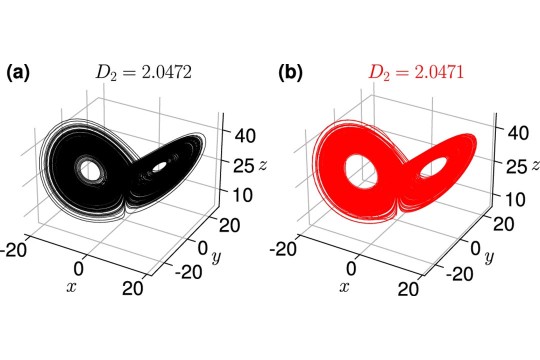
Researchers develop new method for predicting chaos
Mathematician Edward Lorenz used the butterfly effect to explain chaos theory in the 1960s. Now, decades later, a team from RIT has developed a method to predict chaos using less data, fewer parameters, and a more user-friendly format.
-
January 30, 2026
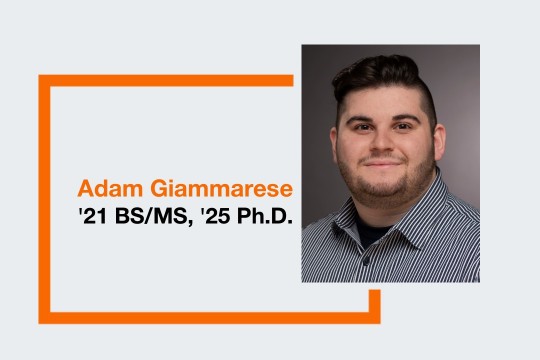
Mathematical modeling alumnus wins early career award
RIT alumnus Adam Giammarese’s work in chaos theory has earned him the Edward N. Lorenz Early Career Award, an annual recognition by the publication Chaos: An Interdisciplinary Journal of Nonlinear Science.
-
October 29, 2025

Simons Empire Faculty Fellowship to fund four College of Science positions
RIT’s College of Science will receive funding from the Simons Empire Faculty Fellowship program for four new tenure-track faculty members.
Research
Current research in the unit involves developing mathematical frameworks to discern properties of a system by working backward from known effects. Application areas include medicine, engineering, finance, earth science and imaging and the focus is on investigating the impact of uncertainty in data, identification of cancer in soft tissues, estimation of material properties, identification of market volatility, and developing fast and reliable methods for large scale computational optimization.
Research Active Faculty:
Current work in the unit includes research and consulting in biostatistics, machine learning, data science, predictive analytics, signals processing, statistical education, and statistical/scientific inference with applications to biology, astrophysics, and engineering.
Research Active Faculty:
Current research in the unit involves developing improved mathematical models of physiological systems; gaining new insights into mechanisms of physiological behavior; improving techniques for diagnosing and treating diseases; and devising advanced algorithms for analyzing physiological measurements.
Research Active Faculty:
Current work in the unit involves developing graph-based models of the brain to study the impact of concussions, improving and developing new graph-based algorithms for hyper-spectral image analysis, applying the growing concepts of complex network analysis to domain-based scientific problems, and applying algebraic techniques and methods to problems in cybersecurity.
Research Active Faculty:
Current work in the unit involves applying mathematical techniques of nonlinear dynamical systems to problems in fluid dynamics, climate modeling, population modeling, cell signaling dynamics, and more; developing mathematical models of thin film and interfacial flows with application to biological fluids, micro-fluidics devices, and industrial coating processes; gaining insights that lead to better prediction of hydrodynamic instabilities, such as turbulence, liquid fuel atomization, and liquid film breakup; devising novel computational methods to simulate fluid transport phenomena; and improving the current understanding of polymer flows and viscoelastic fluids.
Research Active Faculty:
Current work in the unit includes applications of differential geometry, numerical solutions of partial differential equations, and statistical inference to problems related to general relativity and celestial mechanics. Einstein's general theory of relativity is studied as a description of the geometry of spacetime. Advanced numerical and computational techniques are used to solve the coupled, nonlinear, system of PDEs of General Relativity and Magneto-Hydrodynamics. As part of the LIGO Scientific Collaboration, SMS faculty and researchers use statistical signal processing techniques to search for, identify and characterize gravitational-wave signals from astrophysical systems.
Research Active Faculty:
Current work in the unit involves developing new mathematical techniques to study problems of geophysical fluid dynamics, climate modeling, extreme weather, coastal and natural hazards, and other complex systems arising in the study of Earth and environmental systems.
Research Active Faculty:
RIT faculty conduct observational and theoretical research across a wide range of topics in multi-messenger and multi-wavelength astrophysics, utilizing a combination of observations spanning the electromagnetic spectrum, data from gravitational wave detectors, and supercomputer simulations. Current areas of research include numerical relativity and relativistic magnetohydrodynamics, gravitational wave data analysis, compact object binaries, accretion disks and jets, supernovae, and pulsars. RIT is a member of the Large Synoptic Survey Telescope Corporation and faculty are involved in several major collaborations including the Laser Interferometer Gravitational Wave Observatory Scientific Collaboration, the NANOGrav Pulsar Timing Array Consortium and the Laser Interferometer Space Antenna.
Research Centers:
Center for Computational Relativity and Gravitation
Research Active Faculty:
Featured Work and Profiles
-
How Mentorship and Hands-On Learning Led to an Amazon Career
Applied Statistics alum Gabriela Olinto ’16 shows how RIT mentorship, hands-on learning, and career readiness opened doors, strengthened her skills, and helped shape her path to Amazon.
Read More about How Mentorship and Hands-On Learning Led to an Amazon Career -
Harnessing Applied Statistics to Shape Defense Analytics
RIT alum Kimberly Roye ’09 applies her Applied Statistics MS to safeguard critical defense data. From analytics to anomaly detection, she leads work that supports decision-making at the highest levels...
Read More about Harnessing Applied Statistics to Shape Defense Analytics -
From RIT Math to Predicting Delta Flights: A Career Takes Off
From RIT applied math to Delta Air Lines, Theodore Johnston ’20 forecasts demand, works with the FAA, and uses predictive modeling to keep flights and passengers on track.
Read More about From RIT Math to Predicting Delta Flights: A Career Takes Off -
Applied Statistics Powers Success in Healthcare Finance
RIT grad Paul Chwiecko ’02 uses applied statistics and data analytics to drive smarter decisions and improve outcomes in healthcare finance at Excellus BCBS.
Read More about Applied Statistics Powers Success in Healthcare Finance -
How Computational Math Set the Stage for a Startup
At RIT, Luis Andino ’20 developed the problem-solving mindset that now powers his work as founder of Ditch, a fintech startup built on his computational math skills.
Read More about How Computational Math Set the Stage for a Startup -
An International Student’s Path from RIT to the United Nations
An international student from Mexico, Alethia Jimenez ’06 used her RIT education to launch a career at the United Nations, where she collects and uses data to tackle global challenges.
Read More about An International Student’s Path from RIT to the United Nations
Undergraduate Programs
The School of Mathematics and Statistics provides a solid collegiate math education to every RIT undergraduate and offers high-level specializations such as statistical forecasting, digital encryption, and mathematical modeling. We prepare our graduates to be successful, whether they choose immediate employment upon graduation or to attend graduate school in pursuit of advanced degrees.
Solve real-world problems in GPS, manufacturing, encryption, and more with RIT’s applied mathematics bachelor’s degree.
Learn more about the Applied Mathematics BS programGain a strong foundation in statistical methods, computing tools, and real-world applications with RIT’s BS in applied statistics.
Learn more about the Applied Statistics and Data Analytics BS programRIT’s computational mathematics major emphasizes problem-solving using mathematical models to identify solutions in business, science, engineering, and more.
Learn more about the Computational Mathematics BS programGraduate Programs
The School of Mathematics and Statistics equips its graduates with a deep understanding of math principles, a toolbox for applying those skills to real-world problems, and the ability to easily express complex ideas. Our graduate programs introduce students to rigorous advanced applied mathematical and statistical methodology. Students realize the potential for that cutting-edge methodology as a general tool in the study of exciting problems in science, business, and industry.
Build models and solve real-world problems using advanced math and computing across engineering, biology, and more.
Learn more about the Applied and Computational Mathematics MS programAn applied statistics certificate for engineers, analysts, and other professionals to develop a deeper understanding of the statistical methods related to their fields.
Learn more about the Applied Statistics Adv. Cert. programIn this master’s in applied statistics, you’ll learn statistical analysis and apply it to a variety of industries, including insurance, marketing, government, health care, and more.
Learn more about the Applied Statistics MS programModel and solve complex problems across science, business, and engineering with RIT’s Ph.D. in mathematical modeling.
Learn more about the Mathematical Modeling Ph.D. programMinors and Immersions
The actuarial science minor prepares students for work in insurance companies, investment firms, banks, for the government, and in the health care industry where there is a need to analyze the financial consequences of risk. The actuarial science minor prepares students for two exams administered by the Society of Actuaries: the Exam P: Probability, which assesses a candidate's knowledge of the fundamental probability tools for quantitatively assessing risk, and the Exam FM: Financial Mathematics, which assesses a candidate's understanding of the fundamental concepts of financial mathematics and how those concepts are applied in a variety of areas.
Learn more about the Actuarial Science Minor programDeepen your technical background and gain further appreciation for modern mathematical sciences and the use of statistics as an analytical tool.
Learn more about the Applied Statistics Immersion programDeepen your technical background and gain further appreciation for modern mathematical sciences and the use of statistics as an analytical tool.
Learn more about the Applied Statistics Minor programNotes about this immersion:
Learn more about the Mathematics Immersion programThe mathematics minor is designed for students who want to learn new skills and develop new ways of framing and solving problems. It offers students the opportunity to explore connections among mathematical ideas and to further develop mathematical ways of thinking.
Learn more about the Mathematics Minor programUpcoming Math Seminars
This seminar series is focused on all aspects of mathematical modeling, including the development, analysis, refinement, and validation of mathematical models in a wide variety of applications. It is open to the public, and everyone is welcome to attend.
This seminar series is focused on all aspects of inverse problems including, but not limited to differential equations, numerical methods, optimization, uncertainty quantification, experimental techniques, data analysis techniques, and computational methods. InvPrS is open to the public, and everyone is welcome to attend.
DisCoMathS is seminar series for everything discrete: graph theory, combinatorics, combinatorial optimization, applications of discrete mathematics, and computational aspects of all these subjects.
Would you like to donate to our school?
Your gift helps the university support students, attract great faculty members, and maintain leading-edge academic programs.








































































